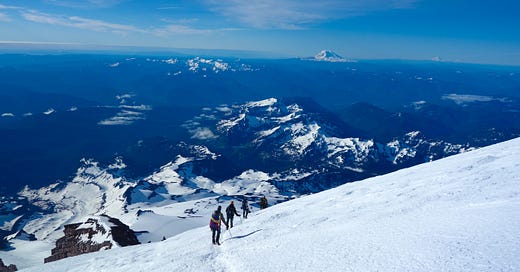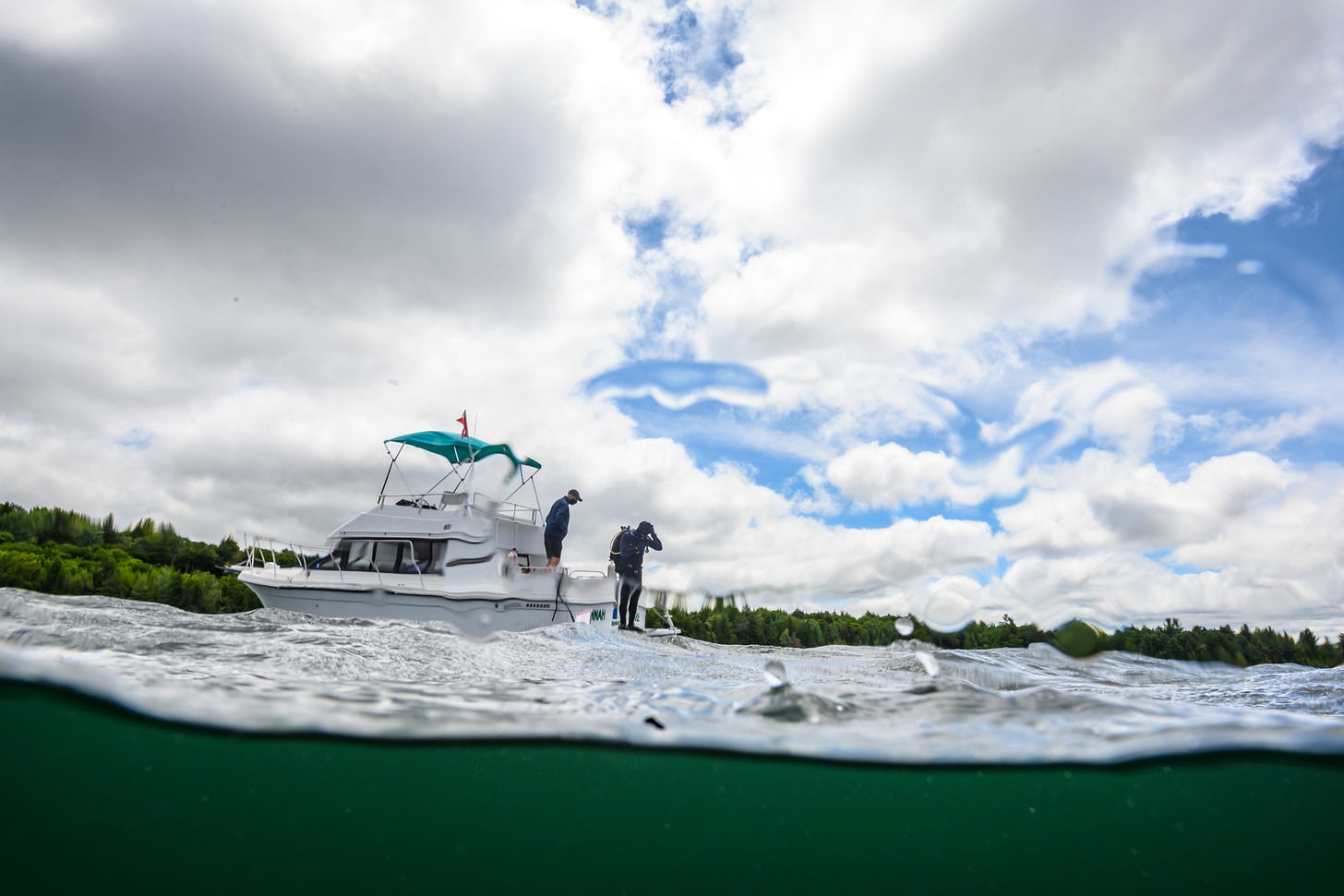Back in 2013, I summited Mount Rainier, the 14,411-foot volcanic peak in Washington. For me, it was a big accomplishment. Living in Minnesota, we do not have proper mountains on which to train, so I did hill repeats on a local ski hill, wearing a heavy backpack. Still, for all the leg strength and cardiovascular fitness I gained, I couldn’t approximate the effects of exerting at high altitude. Where I live, the air is thick and full of oxygen, being a mere 800 feet or so above sea level. In the end, Rainier was a massive challenge and incredibly rewarding. At the time, I was writing almost full-time for Gear Patrol and I had pitched a story about my climb, as well as all the gear it took to do it. I imbued the article with all the grand descriptions of the mountain and my efforts, emulating the great mountaineering literature I’ve grown up reading. My photos were great too, all white seracs and colorful jackets against the deep blue alpine sky. I was quite proud of the story in the end. But then I read a comment from someone who’d read it.
I had climbed Mount Rainier with a professional guiding service, Rainier Mountaineering Inc., that takes teams of climbers up the mountain weekly all summer long. Sometimes the teams make it to the top, sometimes they get pushed back by weather. We got very lucky, with light winds and firm snow on the summer solstice. RMI typically utilizes a crude hut at a high camp overnight, and then makes an alpine start to follow a proven route that passes through the “Disappointment Cleaver” before switchbacking up the final summit push. It’s not easy by any means, fully roped up with crampons and ice axes, but it is a route most reliably used for more novice mountaineers. The commenter on my article, clearly a more experienced climber than me, made ample mention of this fact, while disparaging my article as overblown and hyperbolic. He felt I was exaggerating my accomplishment, making the climb sound more difficult and dangerous than it was. I was embarrassed and slightly deflated to read this, but it taught me a valuable lesson.
Adventure and accomplishment comes in varying degrees. What is one person’s Everest is another person’s Rainier, or vice versa. The same analogy applies to any number of scenarios, from scuba diving, to fiction writing, to car repair, to watch collecting. For some, changing the oil or spark plugs on their car is a major mechanical triumph. Even swimming in the deep end of a pool can be as much an accomplishment for someone as diving a deep shipwreck is for someone else. So while I learned to not over-inflate or embellish my stories with grandiose description, I’ve also learned that it’s more valuable to inspire others through stories than to make myself seem more adventurous, capable, or brave.
I can think of countless examples from my own past where I either felt out of my depth, or conversely, missed an opportunity to inspire someone else through enthusiasm and humility. I’ve written about my past obsession with cycling, and I can recall what a generally insular and snobby sport that can be, with slivers of nuance from leg shaving to pedal choice. What a shame, in a pastime that has roots for so many in childhood freedom of exploring the world under one’s own steam. In diving, there are the tech divers, the holiday divers, and the snorkelers, in a strange and unnecessary caste system. The same holds true even for hikers, where, heaven forbid, you are seen on a trail wearing sneakers and jeans instead of proper boots and technical fabric material pants.
In my own life, I’ve started so many pursuits from the absolute novice level. Before I started diving, I wasn’t even a confident swimmer. But along the way, if there’s someone who encourages you, compliments you, or makes your experience seem special, it can make the difference between someone who will grow into a new passion, or someone who will walk away in frustration or insecurity. Diving is not a sport that needs to involve any ego, and yet, ride on any dive boat and there are always a few hotshot divers who feel the need to demonstrate their prowess, drawing attention to “inferior” gear, comparing past exploits or, most commonly, bragging about how little air they consumed on the preceding dive, making others feel like they’re inadequate.
The true mark of confidence is when a person doesn’t feel the need to draw attention to himself but rather seeks out the less confident or novice in a group and lend gentle advice or give positive feedback. When I first got into cycling in the late ‘90s, I remember suiting up for a lunchtime ride at work with a group of experienced roadies. We were in the locker room, pulling on padded shorts, jerseys, and helmets. One of the group leaned over to me and quietly told me that he was a lot happier when he first learned it’s more comfortable to not wear underwear under his cycling shorts. Game changer, and face saver. No more unsightly panty lines under the spandex in the pace-line, and a lot less chafing (and laundry). Years later, I was able to pay that kindness forward when I saw a new diver on a boat zipping up her wetsuit in the front. I inched over and told her that it was a back zip wetsuit. She had it on backwards. “We’ve all been there,” I reassured her.
While I have always aspired to some of the more exotic and extreme exploits I have long read about, I’ve come to realize that my comfort zone is what I call, “accessible adventuring.” Climbing K2 may be a bucket list item for many, but rather than devote years of training and many thousands of dollars to attempt it, and risk my life doing so, climbing Rainier was good enough for me. It gave me the satisfaction of a big effort, and a window into the experience of big mountain climbing. It is a feat that is accessible to anyone willing to put in a few months training and sign up for a course with a guide service. With diving, it’s the same. There’s no end to the, ahem, depths one can go — ever deeper wrecks, caves, mixed gases, close circuit rebreathers—but for me, I know the limits of my comforts and ambitions, and that is deep technical diving, breathing bottled air. But I’m also just as happy kicking around a shallow reef somewhere. My goal with most of my pursuits is to dip in just deep enough to become proficient and knowledgeable enough to appreciate, discuss, and maybe write about it, but to avoid being “all in” on any one of them. I guess that makes me a “jack of all trades, master of none” but I’m OK with that.
It’s much more rewarding to inspire someone else to become passionate and proficient in something than it is to earn their awe and respect by touting your own accomplishments. I’ve come to realize that in my own writing and photos over the years. When I hear or read someone say, “your article got me into diving,” it is a good feeling. I remember being at a watch event and talking with someone who was wearing a humble Seiko he’d inherited from his father. He knew I wrote about watches professionally and wasn’t sure I’d be interested in his watch. But I genuinely was, and when I assured him of that, he opened up and his enthusiasm and pride overflowed.
Thinking back on that lone comment on my Mount Rainier article, I’m glad the person wrote it. It taught me two lessons early on in my writing career. Firstly, the goal of my writing should not be to make something I’ve done, or something I know, sound impressive. Rather, it should be to make it sound interesting and inviting, realistic yet accessible. Secondly, I never want to be like that guy who wrote the comment, and we all know those people. They’re on the watch blogs and forums, they’re on TV, they’re on the dive boat and at the trailhead. And while perhaps his aim was to put me in my place and establish his own expertise, the funny thing is, expertise and respect are more often earned through encouragement and humility. No matter what hill you’re climbing.





Alan Mjust now
"The true mark of confidence is when a person doesn’t feel the need to draw attention to himself but rather seeks out the less confident or novice in a group and lend gentle advice or give positive feedback."
No truer words were ever said.
Mentors earn their admiration, not the braggarts who seek to diminish others to make their insecure selves appear more competent.
Excellent observations, Jason.
Jason - I read all your stuff here, and sometimes scold myself for not commenting more often. But this one really resonated - in a way I could have written it myself in some overlapping activities and life experiences. For sure there’s an aspect of appreciating that humility and passing along experience is rewarding. But I think your point about accessible adventure is a subject unto itself. Our outdoorsy society, or at least the part which often speaks most loudly, celebrates everything extreme and leads to a broader public mindset (not only do the activities seem unreachable to the average person), but that perhaps the more accessible aspects aren’t even valued on their own merits. Here in Colorado, the hiking crowd can be scornful of those who only hike lower peaks, as if only the highest peaks have merit. I’ve baffled a few of those type-A peak baggers by stating I’m happier doing my own off-trail exploration (actual route finding) in untrampled areas, instead of always following crowded footpaths just to reach the same high point as the masses. So we can encourage others to have accessible adventures not just by sharing and encouraging, but also by simply valuing the importance of the concept.